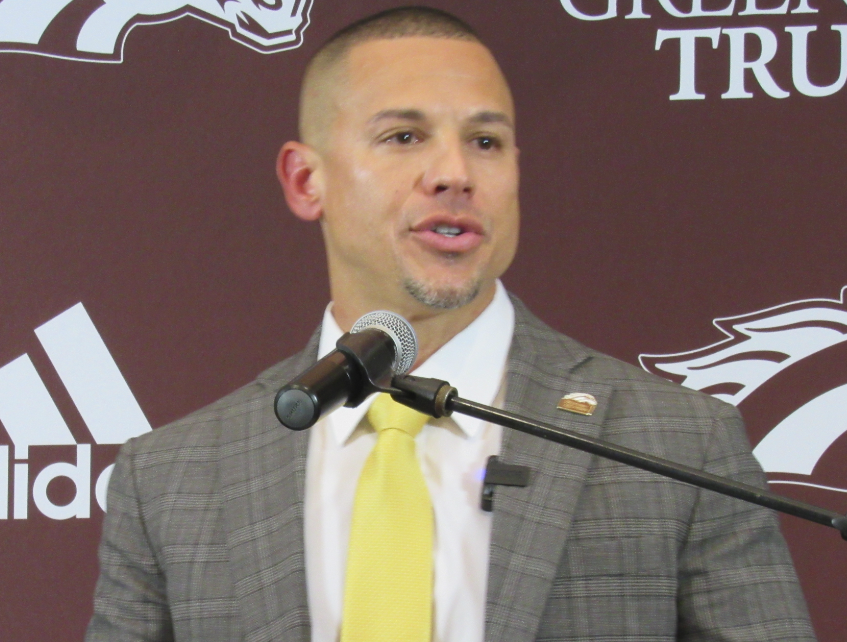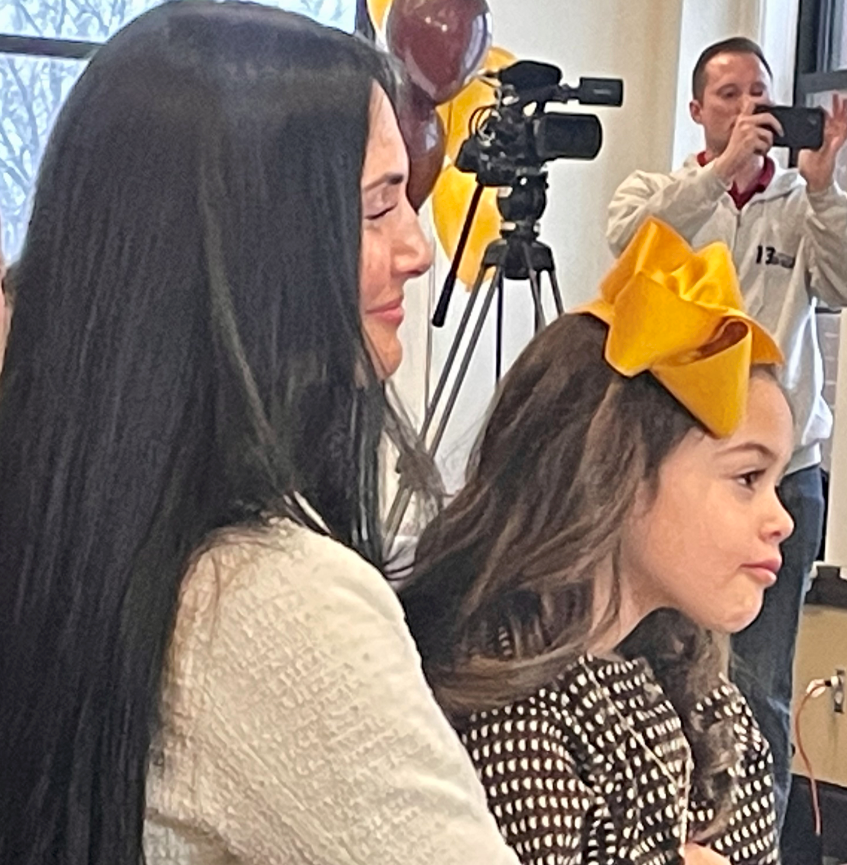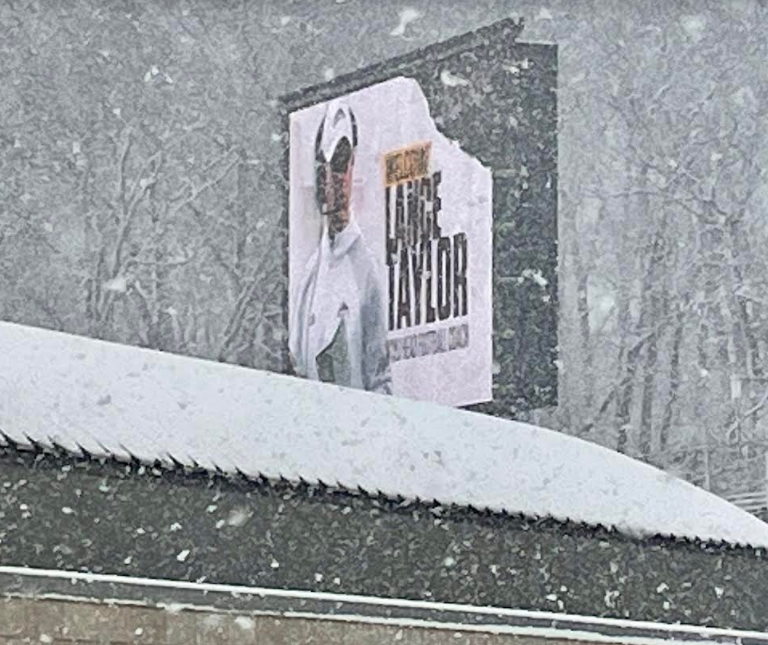
- Details
- By Levi Rickert
KALAMAZOO, Mich. — With music provded by the Western Michigan University’s marching band and cheers from cheerleaders, Lance Taylor (Choctaw), accompanied by his wife and two young children, walked into Heritage Hall on Friday afternoon for what can be described as part pep rally and part press conference to be introduced as the head coach of the WMU Football program.
Friday’s event comes one day after the university announced his hiring to be the 17th football head coach.
Taylor, 41, a member of the MOWA Band of Choctaw Indians, which is a state recognized tribe in Alabama, excited the crowd with his fiery conviction to play the game to win. He began his remarks with “Go, Broncos”
“I will not shy away from high goals. We will work to be great every single day in every way. I will work relentlessly every single day in every way and set the standard of excellence for our players, coaches and everyone that touches our program,” Taylor said.
During the Q&A portion of the press conference, Taylor was asked by Native News Online how he integrates Native American warriorship into his coaching style.
“I grew up two miles from my reservation and grew up going to powwows, learning our culture, history, and traditions. It was woven and made me who I am today. It is part of the fabric of what I do and what I believe in,” Taylor said. “I think it will come out through our program as I carry out our mission every single day. So, I am proud of my heritage and love my people and I know they are proud of me.”
Kurt Trevan (Gun Lake Tribe), an undergraduate of the university, currently sits on the Western Michigan University’s Board of Trustees.
“The hiring of Coach Taylor is a huge win for the university and also for Indian Country. He exemplifies the result of hard word and determination, and will serve as an inspiration for our Native youth to dream big,” Trevan said to Native News Online on Friday.
Dan Bartholomae, WMU Athletic Director told Native News Online while the university was able to hire the best candidate in the pool of finalists, Taylor was one of the best leaders he talked to in the selection process.
“One that inspired me was how his Choctaw heritage, the life experiences that he drew from as a part of the tribe, and his pride in his family history impacted his amazing rise to the top of our profession,” Bartholomae said.

The WMU Football program is part of the NCAA’s Football Subdivision of Division I and is a member of the Mid-American Conference (MAC).
Taylor is currently the only Native American coach at the Division I level. Previously, Jerome Souers (Cheyenne River Sioux) served as head football coach at Northern Arizona for 21 years before stepping down from that position in 2018.
Taylor arrives at Western Michigan University after spending the 2022 season as the offensive coordinator at the University of Louisville. Prior to his time with the Cardinals, Taylor spent three seasons as the running backs coach and run game coordinator at the University of Notre Dame, guiding the Fighting Irish to a College Football Playoff appearance in 2022 and a New Year's Six Fiesta Bowl appearance in 2021.
During those three seasons with the Irish, Taylor guided running back Kyren Williams to a pair of 1,000-yard seasons in 2020 and 2021. Williams rushed for 1,002 yards and 14 touchdowns last season. As a redshirt freshman in 2020, he produced 1,125 yards and 13 scores to earn Freshman All-American accolades and was a finalist for Freshman of the Year.
Taylor had two coaching stints with the Carolina Panthers, where he coached Wide Receivers. In 2013 the Panthers finished 12-4, winning the NFC South.
In between his two coaching stops with the Carolina Panthers, Taylor coached running backs at Stanford, where he coached and mentored Heisman Trophy runner-up Christian McCaffrey and recruited a second Heisman runner-up in Bryce Love. McCaffrey and Love hold three of the top five rushing seasons in Stanford history. While with the Cardinal, Taylor won a Pac-12 Championship, a Rose Bowl and was named the 2015 FootballScoop.com Running Backs Coach of the Year.

Taylor spent the 2010 – 2012 seasons with the New York Jets as an offensive quality control coach and assistant tight ends coach. During the 2010 season, the Jets won their wild card game and divisional playoff game against the New England Patriots and appeared in the AFC Championship game.
In 2009, he coached wide receivers at Appalachian State, where under his guidance the Mountaineers set school records with 284 receptions and 3,621 receiving yards. The team finished 11-3, won the Southern Conference title and advanced to the Football Championship Subdivision semifinals.
He began his coaching career as a graduate assistant for Nick Saban at his alma mater, Alabama, from 2007-08.
A walk-on at Alabama before earning a scholarship, Taylor played in 38 consecutive games at wide receiver from 1999-2003 for the Crimson Tide. As a senior, he served as a special team's captain for (then) coach Mike Shula.
Taylor played professionally for the Colorado Crush and Columbus Destroyers of the Arena Football League, and AF2's Green Bay Blizzard and Louisville Fire from 2004-06.
Taylor graduated from Alabama in 2003 with a degree in management. Taylor's father, James, also attended Alabama and played running back under legendary head coach Paul "Bear" Bryant.
A native of Mt. Vernon, Alabama, Taylor's family includes his wife Jamie, son Jet, and daughter Jemma.
More Stories Like This
Bard College Center for Indigenous Studies (CfIS) Hosts Annual Symposium With Keynote Speaker Miranda Belarde-Lewis on March 9–10American Indian College Fund Announces Spring 2026 Faculty Fellow Cohort
Navajo Nation Signs $19 Million Diné Higher Education Grant Fund Act into Law
Dr. Shelly C. Lowe to Be Inaugurated as IAIA President March 26–27
Tlingit Language Courses Expand for Students to Learn With Families At-Home
Help us defend tribal sovereignty.
At Native News Online, our mission is rooted in telling the stories that strengthen sovereignty and uplift Indigenous voices — not just at year’s end, but every single day.
Because of your generosity last year, we were able to keep our reporters on the ground in tribal communities, at national gatherings and in the halls of Congress — covering the issues that matter most to Indian Country: sovereignty, culture, education, health and economic opportunity.
That support sustained us through a tough year in 2025. Now, as we look to the year ahead, we need your help right now to ensure warrior journalism remains strong — reporting that defends tribal sovereignty, amplifies Native truth, and holds power accountable.
 The stakes couldn't be higher. Your support keeps Native voices heard, Native stories told and Native sovereignty defended.
The stakes couldn't be higher. Your support keeps Native voices heard, Native stories told and Native sovereignty defended.
Stand with Warrior Journalism today.
Levi Rickert (Potawatomi), Editor & Publisher


